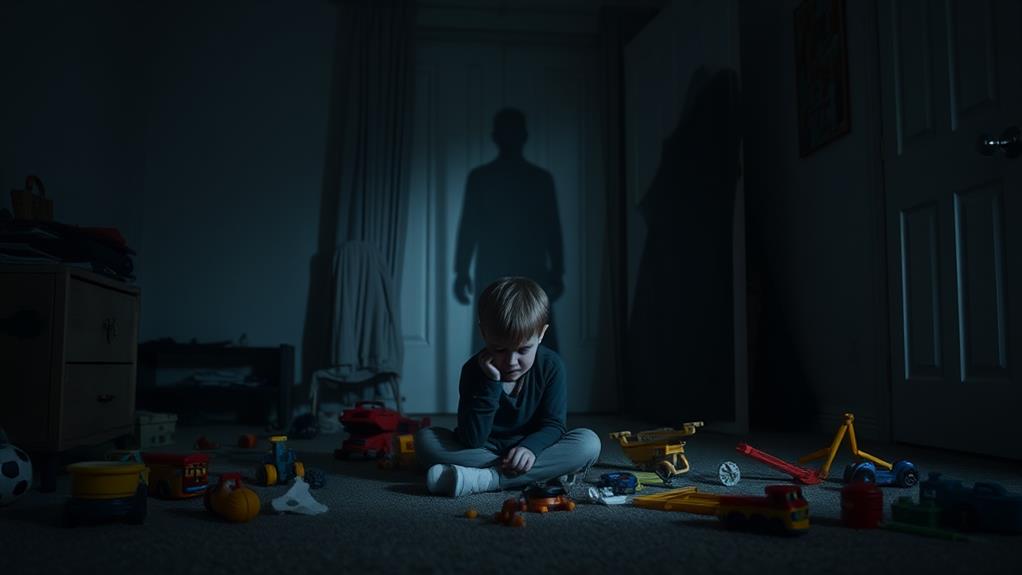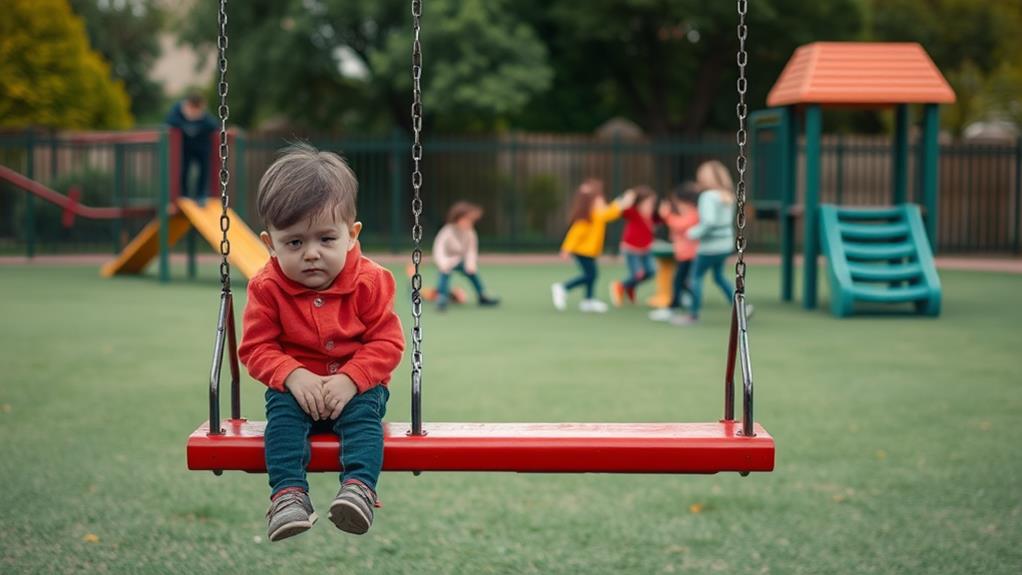You might notice your child struggling with everyday tasks or interactions, which can be concerning. From ADHD to anxiety disorders, various behavioral issues can affect their development and well-being. It's essential to recognize when these behaviors cross a line, impacting their daily life and relationships. Understanding when to seek help can make a significant difference in their future. Are you aware of the key signs to look out for, or how early intervention could change everything?
Attention Deficit Hyperactivity Disorder

Attention Deficit Hyperactivity Disorder (ADHD) is a common condition that affects many children today. If you notice your child having trouble focusing, staying still, or following instructions, it could be a sign of ADHD.
Kids with this condition often find it hard to concentrate on tasks, leading to challenges in school and at home. You might see them daydreaming, fidgeting, or interrupting others frequently, which can be frustrating for both you and them.
ADHD isn't just about being hyper; it also includes issues with attention and impulse control. It's essential to understand that these behaviors aren't due to laziness or a lack of discipline. Instead, they stem from differences in brain function that make it harder for your child to regulate their behavior.
If you suspect your child has ADHD, consider talking to a healthcare professional who specializes in child behavior. They can assess your child and provide guidance on managing symptoms effectively.
With the right support, children with ADHD can thrive in their school and social environments. Remember, early intervention can make a significant difference in helping your child succeed!
Oppositional Defiant Disorder
Oppositional Defiant Disorder (ODD) is a behavioral condition that can cause significant challenges for both children and their families. Kids with ODD often display a pattern of angry outbursts, defiance, and a strong tendency to argue with authority figures.
You might find that your child refuses to follow rules, blames others for their mistakes, or gets easily annoyed by peers. These behaviors can disrupt daily life and lead to frustration for everyone involved.
Recognizing ODD is essential. If you notice that your child's defiance is persistent, lasts for six months or more, and interferes with their ability to function at home or school, it may be time to seek help.
Early intervention can make a huge difference in managing these behaviors effectively. Working with a mental health professional can help you understand your child's needs better.
They can provide guidance on strategies to improve communication and develop coping skills. Remember, you're not alone in this journey. Many families face similar challenges, and with the right support, you can help your child thrive.
Don't hesitate to reach out for assistance when you need it.
Anxiety Disorders

Anxiety disorders in kids can manifest in various ways, from excessive worry about school performances to physical symptoms like stomachaches and headaches. You might notice your child feeling restless or having trouble concentrating, often worrying about things that seem minor to you.
This constant anxiety can interfere with their daily life, making it hard for them to enjoy activities or socialize with friends. It's essential to recognize that these feelings are more than just normal nerves; they can be part of a larger issue.
If your child's anxiety leads to avoidance of school, friends, or other activities, it may be time to seek help. Look for signs like irritability, fatigue, or changes in sleep patterns. Sometimes, kids express their anxiety through tantrums or clinginess, which can be confusing for you.
Don't hesitate to talk to a pediatrician or a mental health professional if your child shows these signs. Early intervention can make a significant difference in how they cope with anxiety, helping them develop healthy strategies to manage their feelings.
Depression in Children
While it's normal for kids to feel sad or down from time to time, persistent feelings of hopelessness or disinterest can signal depression. You might notice your child withdrawing from activities they once enjoyed, struggling to concentrate, or experiencing changes in sleep and appetite. These signs can be concerning, and it's important to pay attention to them.
Kids often express their feelings differently than adults, so you may hear them say they're "just tired" or "just don't care." However, if these feelings linger for weeks and start to interfere with their daily life, it's time to take action. Encourage open conversations about their emotions, letting them know it's okay to share how they feel.
If you're worried your child might be depressed, don't hesitate to seek help. A mental health professional can provide support and guidance tailored to your child's needs. Remember, seeking help isn't a sign of weakness; it shows your commitment to your child's well-being.
Early intervention can make a significant difference, helping them regain their joy and energy. Trust your instincts—if something feels off, it's always better to check in and see how they're doing.
Conduct Disorder

When it comes to behavioral issues, conduct disorder is a serious concern that can manifest in children and adolescents. This condition often leads to patterns of behavior that are aggressive, deceitful, or severely disruptive. You might notice your child frequently breaking rules, showing little regard for authority, or even harming others.
These behaviors can significantly impact their relationships with peers and family, making it essential to recognize the signs early on. It's important to understand that conduct disorder isn't just a phase; it can lead to more serious issues if left unaddressed.
If your child exhibits persistent patterns of aggression, bullying, or destruction of property, it's time to seek help. Consulting a mental health professional can provide insight and strategies tailored to your child's needs.
Early intervention is crucial. The sooner you address these behaviors, the better the chances are for improvement. Therapies, counseling, and sometimes medication can be effective in managing conduct disorder.
Autism Spectrum Disorder
Many families find themselves navigating the complexities of Autism Spectrum Disorder (ASD), a developmental condition that affects how a child communicates and interacts with others. Understanding ASD is essential, as it manifests differently in each child. Some may struggle with verbal communication, while others might display unusual behaviors or intense interests.
It's important to recognize the signs early on. You might notice that your child has difficulty making eye contact, prefers to play alone, or shows a strong attachment to specific routines. These behaviors can be confusing, but know that you're not alone in this journey.
Many resources and support systems are available to help you and your child thrive. Seeking help is a proactive step. Early intervention can significantly improve your child's development.
Therapies like speech and occupational therapy often make a big difference. Connecting with specialists who understand ASD can provide valuable strategies tailored to your child's unique needs.
Social Skills Challenges

Navigating social skills challenges can be overwhelming for children with Autism Spectrum Disorder (ASD) and their families. Social interactions can feel like a minefield, where understanding cues, making eye contact, or even knowing when to speak can become significant hurdles.
You might notice that your child struggles to connect with peers, leading to feelings of isolation or frustration. It's essential to recognize that these challenges are common and not a reflection of your child's worth. They often need extra support to develop social skills.
Engaging in activities that promote teamwork, like group sports or collaborative games, can be beneficial. Role-playing different social scenarios at home can also help your child practice responses and reactions in a safe space.
Additionally, consider seeking guidance from professionals, such as speech therapists or social skills groups specifically designed for children with ASD. These resources can provide targeted strategies to improve communication and build friendships.
Sleep Disorders
Social skills challenges aren't the only hurdles children with Autism Spectrum Disorder (ASD) face; sleep disorders can also significantly impact their daily lives. Many kids with ASD struggle to fall asleep, stay asleep, or wake up too early, leading to fatigue and irritability.
This lack of quality sleep can hinder their ability to concentrate at school and engage with peers, making social interactions even more challenging.
If you notice your child has trouble sleeping, it's essential to observe their routine. Establishing a calming pre-bedtime ritual can help signal that it's time to wind down. This might include reading a book, dimming the lights, or listening to soft music.
Consistency is key, so try to stick to a regular sleep schedule, even on weekends.
It's also important to assess their sleep environment. A dark, quiet room free from distractions can make a huge difference.
If these strategies don't work, or if your child seems overly anxious about sleep, it might be time to consult a healthcare professional. They can provide tailored advice and support to help your child achieve better rest, ultimately improving their overall well-being and daily functioning.
Learning Disabilities

Learning disabilities can create significant barriers for children as they try to thrive academically and socially. These challenges may affect reading, writing, math, and even organizational skills. If you notice your child struggling to keep up with peers, it's essential to pay attention. Symptoms like difficulty following instructions, trouble remembering information, or frequent frustration with schoolwork can all be signs of a learning disability.
It's important to remember that these challenges aren't a reflection of your child's intelligence or potential. They may simply learn differently. Early intervention is crucial, as it can significantly improve your child's outcomes. If you suspect your child has a learning disability, consider seeking help from educators or specialists. They can conduct assessments to identify specific needs and create tailored strategies.
You're not alone in this journey. Many resources, including support groups and educational programs, are available to help both you and your child navigate these challenges.




